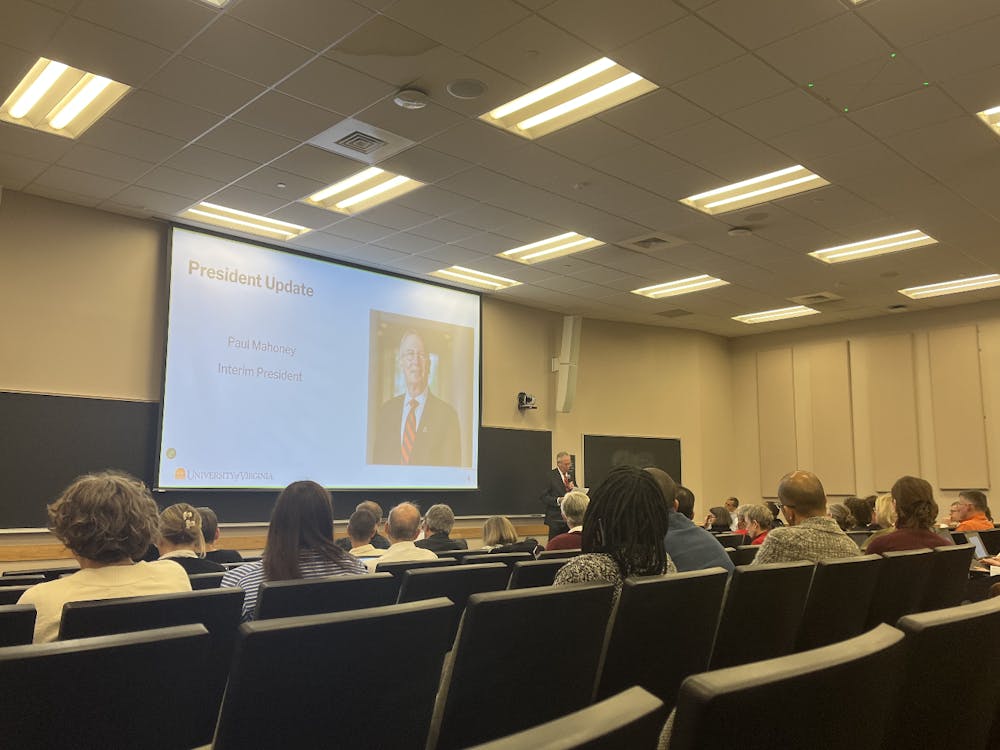The University's Board of Visitors had their quarterly meeting last weekend over three days.
The Board unanimously passed the 2001-2002 budget Thursday, which for the first time includes $1.42 million for graduate student health insurance.
According to Colette Sheehy, vice president for management and budget, the money will cover the $915 yearly cost of QualChoice's basic student health plan for teaching assistants or research assistants who earn at least $5,000 a year. The funds also will cover students with fellowships of at least $5,000 a year.
About 2,000 graduate students, or 60 percent of all graduate students, are eligible to receive the subsidy. Darden, Law and Medical school students are not eligible, Sheehy said.
The fund is a triumph for graduate students who have been pressing the issue for the past year.
"It's very exciting. We consider it a huge victory for the [Graduate Labor] Alliance," said Justin Gifford, an English graduate student and GLA founder.
The GLA, among other University activist organizations, held a protest last April to pressure the University into providing health insurance for all University graduate students.
According to Gifford, although the current solution is a victory, the GLA will continue to fight for full coverage of all College graduate students.
The 40 percent of students who are not eligible "are the people who are not teaching and they are not going to get covered. They are the most vulnerable," Gifford said. "We'll be fighting for more money next year."
Patrick McGuinn, outgoing president of the Graduate Student Council, said the GSC will continue to push for coverage for all graduate students, including their spouses and children.
McGuinn also said he is concerned the University might not pay for the cost increase of the basic plan from year to year and that the money for the health insurance might be taken away from other graduate student money.
The Board also approved a $816.3 million budget for the academic division of the University, a 7.4 percent increase from 2000-2001. The University Medical Center is budgeted for $575.6 million, a 7.5 percent increase, and the University of Virginia's College at Wise will receive 18.8 million next year, a 1.1 percent increase.
No money was earmarked for faculty and staff salary increases because the General Assembly must approve all salary increases, and they failed to do so during their last session.
Leonard W. Sandridge Jr., executive vice president and chief operating officer, said at the meeting he expects the General Assembly will approve the increase in funds during its next session in January. Faculty and staff would receive retroactive pay, he said.
No discussion of Burma issue
Despite student campaigns demanding that the University divest relations in Burma, the Board did not act to close ties with Burma on Saturday.
"The Board decided to take no action because ... of the precedent that it would set," Board member and former U.S. Rep. Thomas J. Bliley Jr. said in an interview. "Who knows what would come next, maybe China."
Board members do not handle investment issues themselves but rely on the University Investment Management Company to make financial decisions, he added.
Student groups, including Student Council and the University's Free Burma Coalition, appealed to the Board to adopt a Unocal shareholder's resolution that would require the University to disclose ties with corporations that conduct business in Burma. According to the resolution, the University owns $2.1 million in Unocal, a Los Angeles-based oil company that built a pipeline in Burma in 1996. Unocal is one of the last American companies still doing business in Burma and is alleged to have given money to the Burmese military regime in order to do business there.
"The Board established a professorship in ethics, and it strikes me that a decision to remain complacent in the face of the atrocities in Burma flies in the face of that move," Student Council President Abby Fifer said.
However, Fifer said she is encouraged by the Board's position of neutrality and hopes student challenges of the issue will continue to arise.
Concern over student debt
For the first time in the University's history, the incoming class of 2005 will be offered 100 percent of its demonstrated financial need. But some of that need will be met in the form of student loans, and undergraduate students may leave the University with debts over $20,000.
The Board discussed this financial aid problem at its meeting on Friday.
Yvonne Hubbard, director of student financial services, gave a presentation showing the basic facts and figures of student financial aid. Several Board members expressed concern about the amount of indebtedness of students, Hubbard said.
A student should not have to leave college with the "ball and chain" of student loans, Board member Terrence P. Ross said.
Ross said he hopes the Board can find a way to reduce the amount of student debt, which averages about $12,000 for in-state undergraduates with loans and $17,000 for out-of-state undergraduates with loans.
Federal student loans account for 28 percent of University students' need-based aid, the highest source of financial aid.
Hubbard said the University always first offers loans to students who need money. The rest of their need is met with grants, endowment money and other sources.
The Board will continue discussing undergraduate debt at its retreat next month, and again with Hubbard at its October meeting, Ross said.






